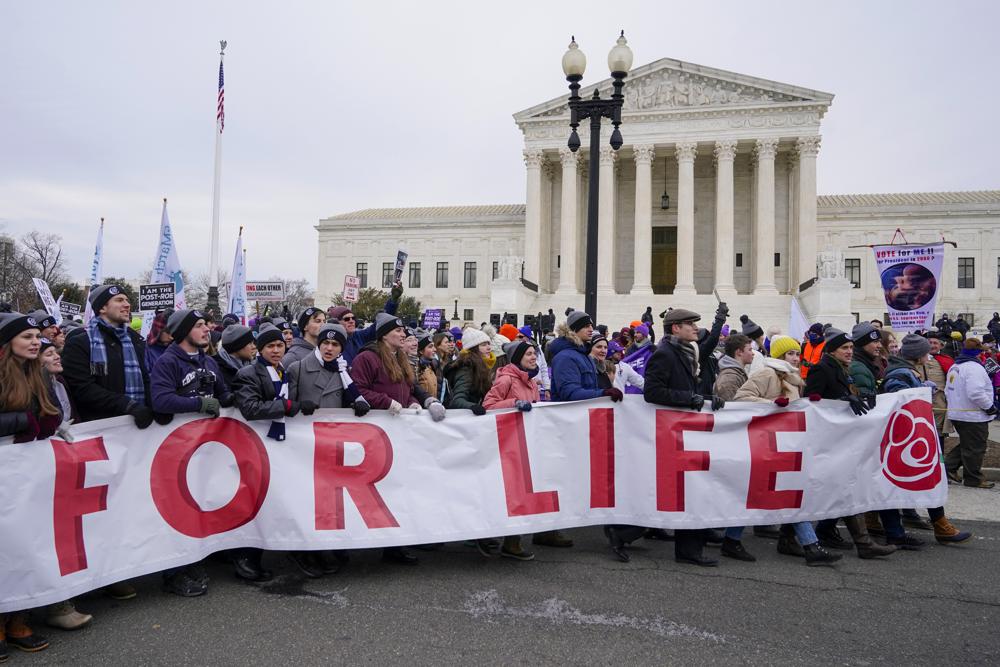The Supreme Court has ended constitutional protections for abortion that had been in place nearly 50 years in a decision by its conservative majority to overturn Roe v. Wade. Friday’s outcome is expected to lead to abortion bans in roughly half the states.
The decision, unthinkable just a few years ago, was the culmination of decades of efforts by abortion opponents, made possible by an emboldened right side of the court that has been fortified by three appointees of former President Donald Trump.
The ruling came more than a month after the stunning leak of a draft opinion by Justice Samuel Alito indicating the court was prepared to take this momentous step.
It puts the court at odds with a majority of Americans who favored preserving Roe, according to opinion polls.
Alito, in the final opinion issued Friday, wrote that Roe and Planned Parenthood v. Casey, the 1992 decision that reaffirmed the right to abortion, were wrong the day they were decided and must be overturned.
“We hold that Roe and Casey must be overruled. The Constitution makes no reference to abortion, and no such right is implicitly protected by any constitutional provision,” Alito wrote.
Authority to regulate abortion rests with the political branches, not the courts, Alito wrote.
Joining Alito were Justices Clarence Thomas, Neil Gorsuch, Brett Kavanaugh and Amy Coney Barrett. The latter three justices are Trump appointees. Thomas first voted to overrule Roe 30 years ago.
Chief Justice John Roberts would have stopped short of ending the abortion right, noting that he would have upheld the Mississippi law at the heart of the case, a ban on abortion after 15 weeks, and said no more.
Justices Stephen Breyer, Sonia Sotomayor and Elena Kagan — the diminished liberal wing of the court — were in dissent.
“With sorrow—for this Court, but more, for the many millions of American women who have today lost a fundamental constitutional protection—we dissent,” they wrote.
The ruling is expected to disproportionately affect minority women who already face limited access to health care, according to statistics analyzed by The Associated Press.
Thirteen states, mainly in the South and Midwest, already have laws on the books that ban abortion in the event Roe is overturned. Another half-dozen states have near-total bans or prohibitions after 6 weeks of pregnancy, before many women know they are pregnant.
In roughly a half-dozen other states, the fight will be over dormant abortion bans that were enacted before Roe was decided in 1973 or new proposals to sharply limit when abortions can be performed, according to the Guttmacher Institute, a research group that supports abortion rights.
More than 90% of abortions take place in the first 13 weeks of pregnancy, and more than half are now done with pills, not surgery, according to data compiled by Guttmacher.
The decision came against a backdrop of public opinion surveys that find a majority of Americans oppose overturning Roe and handing the question of whether to permit abortion entirely to the states. Polls conducted by The Associated Press-NORC Center for Public Affairs Research and others also have consistently shown about 1 in 10 Americans want abortion to be illegal in all cases. A majority are in favor of abortion being legal in all or most circumstances, but polls indicate many also support restrictions especially later in pregnancy.
The Biden administration and other defenders of abortion rights have warned that a decision overturning Roe also would threaten other high court decisions in favor of gay rights and even potentially, contraception.
But Alito wrote in his draft opinion that his analysis addresses abortion only, not other rights that also stem from a right to privacy that the high court has found implicit, though not directly stated, in the Constitution. Abortion is different, Alito wrote, because of the unique moral question it poses.
Whatever the intentions of the person who leaked Alito’s draft opinion, the conservatives held firm in overturning Roe and Casey.
In his draft, Alito dismissed the arguments in favor of retaining the two decisions, including that multiple generations of American women have partly relied on the right to abortion to gain economic and political power.
Changing the composition of the court has been central to the anti-abortion side’s strategy. Mississippi and its allies made increasingly aggressive arguments as the case developed, and two high-court defenders of abortion rights retired or died. The state initially argued that its law could be upheld without overruling the court’s abortion precedents.
Then-Gov. Phil Bryant signed the 15-week measure into law in March 2018, when Justices Anthony Kennedy and Ruth Bader Ginsburg were still members of a five-justice majority that was mainly protective of abortion rights.
By early summer, Kennedy had retired and was replaced by Justice Brett Kavanaugh a few months later. The Mississippi law was blocked in lower federal courts.
But the state always was headed to the nation’s highest court. It did not even ask for a hearing before a three-judge panel of the 5th U.S. Circuit Court of Appeals, which ultimately held the law invalid in December 2019.
By early September 2020, the Supreme Court was ready to consider the state’s appeal.
The court scheduled the case for consideration at the justices’ private conference on Sept. 29. But in the intervening weeks, Ginsburg died and Barrett was quickly nominated and confirmed without a single Democratic vote.
The stage now was set, although it took the court another half year to agree to hear the case.
By the time Mississippi filed its main written argument with the court in the summer, the thrust of its argument had changed and it was now calling for the wholesale overruling of Roe and Casey.
The first sign that the court might be receptive to wiping away the constitutional right to abortion came in late summer, when the justices divided 5-4 in allowing Texas to enforce a ban on the procedure at roughly six weeks, before some women even know they are pregnant. That dispute turned on the unique structure of the law, including its enforcement by private citizens rather than by state officials, and how it can be challenged in court.
But Justice Sonia Sotomayor noted in a searing dissent for the three liberal justices that their conservative colleagues refused to block “a flagrantly unconstitutional law” that “flouts nearly 50 years of federal precedents.” Roberts was also among the dissenters.
Then in December, after hearing additional arguments over whether to block the Texas law known as S.B. 8, the court again declined to do so, also by a 5-4 vote. “The clear purpose and actual effect of S. B. 8 has been to nullify this Court’s rulings,” Roberts wrote, in a partial dissent.
In their Senate hearings, Trump’s three high-court picks carefully skirted questions about how they would vote in any cases, including about abortion.
But even as Democrats and abortion rights supporters predicted Kavanaugh and Gorsuch would vote to upend abortion rights if confirmed, the two left at least one Republican senator with a different impression. Sen. Susan Collins of Maine predicted Gorsuch and Kavanaugh wouldn’t support overturning the abortion cases, based on private conversations she had with them when they were nominees to the Supreme Court.
Barrett was perhaps the most vocal opponent of abortion in her time as a law professor, before becoming a federal judge in 2017. She was a member of anti-abortion groups at Notre Dame University, where she taught law, and she signed a newspaper ad opposing “abortion on demand” and defending “the right to life from fertilization to natural death.” She promised to set aside her personal views when judging cases.
Trump, meanwhile, had predicted as a candidate that whoever he named to the court would “automatically” vote to overrule Roe.
(AP)












27 Responses
ב”ה for our innocent embryos, who are fully deserving of their civil liberties, to have life and enjoy השם’s wonderful world.
The danger they created is that the rich will be able to get it through traveling and the poor will endanger themselves by doing it in back alleys.
Thank you President Donald Trump for saving innocent lives, and you President Donald Trump are definitely receiving our vote come November 5, 2024
Boruch Hashem. The slaughter will unfortunately continue, but at least some states will be able to stop it happening within their borders.
If I had to guess, the vax is proving effective, so they’re likely to step back on all the other NSSM 200 population control initiatives, which was the foundation of Roe v Wade. Maybe they’ll stop pushing abominable perversions soon too.
It was bad law. The issue was emotionally-charged because of the subject, but it was just plain bad law.
They couldn’t even pass a federal law about it a month ago. You want a Constitutional right? Go pass an amendment that is explicit; there’s a process.
Sally – “I believe in a woman’s right to autonomy over her body!”
Mary – “So, you’re against vaccine mandates, then?”
Sally – uh….
It largely doesn’t affect us since (if goyim do, or do not, want to kill their babies doesn’t directly impact on us), but it might influence Eretz Yisrael which under the zionists tends to look at America for inspiration.
Now you know who leaked it, that fence walker fake phony coward Roberts!
geez, that fat slob Sotomiser claims she is a good Catholic, REALLY!
If I killed a kitten going 60 in a 55 MPH zone i’d be jailed yet killing babies is OK, that’s the Dems for ya!
Maixine Waters is out there protesting, hahaha, My body, My rights, hahahaha I don’t think she has anything to worry about. Geez she makes Aunt Esther look good!
Agudah quickly spoke in favor of the decision. Where is the OU? They don’t want to offend their good friends on the left like Hillary
I like when you see on TV these cows that want abortion rights, hahahaha
What does the Absentee Pope have to say about this?
Make sure you sell your Stocks in companies that make the long forceps that rip the baby limb from limb cuz i’m sure the demand for them will drop.
If you kill a pregnant woman with a 1 month old fetus in her while DWI you get charged for 2 homocides!
Read Kavanaugh’s and Roberts’ “concurrences” where they make clear how strongly they disagree with Thomas’ statement that the Court should also reverse Griswold (contraception) Lawrence (consensual gay relations) and Obergefell (same-sex marriage). Even the Alito opinion is explicit in limiting the impact to abortion only and no other implied constitutional rights.
Right to a bris? At risk. Right to shechita? At risk. If the Supreme Court can take away a right like this, who knows what’s next. While we might be against abortion for ourselves, Yidden should not be celebrating this.
Several states have laws already on the books, that would prohibit Jews from obtaining an abortion to protect the life of the mother, which is required – required – under Halacha. If and when a case presenting that issue comes forward, it will, if decided in favor of Halacha, create a loophole for Jews, and non-Jews will seek equal protection of the laws to protect the lives of non-Jewish mothers. This could get very ugly, and bad for the Jews.
So much for keeping the planet green and safe! LoL
“Tatti, what’s ‘abortion?’
“Ask your mother”
Should have added this to my first post. The idea being that YWN is viewed by many people, including youngsters of all ages some of which might end up asking their parents this somewhat unsettling question. Or should I just assume that every kid from age of 5 years old already knows about everything, so the theoretical question is unlikely to arise?
Benji69: Leave Aunt Esther out of this Fred Sanford, you heathen!
Note The Supreme Court did NOT prohibit, or restrict abortions. They did NOT hold that unborn children have rights under the Constitution. All they said is that the 14th amendment didn’t cover abortion, largely since at the time the amendment was states routinely criminalized abortion, so there is no way that a “right to abort your own children” was among the rights guaranteed to African Americans under the Constitution. Since under American law, unless a power is specifically given over to the Federal government, it defaults to the states.
Huju: Several states have laws already on the books, that would prohibit Jews from obtaining an abortion to protect the life of the mother
LIAR. You filthy LIAR. How can you make up such a blatant lie. Not one state has such a law, nor is anyone even proposing such a law in any state! There is zero chance of any state passing such a law in the foreseeable future. There is simply no support for it, even in the strongest pro-life camp. Abortion to save the mother’s life (in the extremely rare case that such is necessary) is completely safe everywhere.
American Yerushalmi, why should a five-year-old not know that some goyim are so cruel that they murder innocent little babies while still in their mother’s womb?